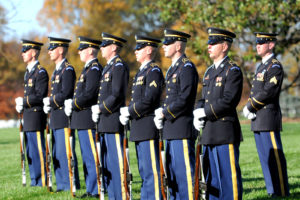
Members of the U.S. Army Ceremonial Honor Guard prepare for the 21-gun salute in Arlington National Cemetery, Nov. 17, 2009. U.S. Navy Petty Officer 3rd Class William Selby
There’s something about anniversaries that make them extremely important to veterans. Birthdays and wedding anniversaries are important to many people, of course, and are remembered with cards and gifts, but veterans celebrate different anniversaries than others. We remember milestones in our career: promotions, or deployments. We celebrate some, knowing that they are important points in our lives, and try to forget others. Sometimes important dates sneak up on us; I only recently realized that it has been ten years since my deployment to Iraq. While the date is important, sometimes the lapse in time tends to be lost; I recently met an old Army buddy while I was at a conference in Chicago. We hadn’t seen each other in twenty years.
Holidays are anniversaries every year, cause for celebration. Let’s face it, some holidays mean more to veterans than to others. Memorial Day and Veterans Day mean very different things to those who have served, and those family members who have served with them, than those who have not. Every year there is an uproar from those who try to remind the public of the “true meaning” of Memorial Day, while Veterans Day seems to bring more “thank you for your service”
Unfortunately, many veterans have their own personal Memorial Days, separate from the last Monday in May. Veterans often remember all too well moments of great pain and grief. Significant battles are remembered every year: The Battle of Sadr City in March of 2008, the Battle of the Kamdesh on October 3rd every year, the Tet Offensive in January. These events are significant for those that fought in those battles, but also for historians. There are even national days of remembrance: D-Day on June 6th, Pearl Harbor Day on December 7th. It may seem as though diffusion, and time, fade these events like an old Polaroid photograph, but for those who were there and who were affected by it, these remembrances remain extremely personal.
There are thousands of moments of private memorials, however, that are not widely known or universally remembered. There are moments shared by mere hundreds, but the number of people who know of or remember the moment in no way diminishes the sacrifice of those memorialized. These are the days where we lost someone, a fellow service member who paid the ultimate sacrifice. The days where we sometimes think back to where we were when we heard the news, or saw what happened. These anniversaries are often the most significant, and most difficult, for a veteran to bear.
There is often no telling at what point in the year that a veteran will have a reaction to an anniversary, as it has to do with their own experiences. For many current-era veterans, there are multiple opportunities to develop these memories: two, three, sometimes five deployments or more. There are even times when significant events sneak up on the veteran themselves; I was speaking with a veteran recently who had experienced some unexpected struggles, and our conversation uncovered the fact that this time of year was about the same time as a significant event during their deployment. It happened to me last year. But not this year. More on that in a moment.
So there are two different ways that we can react to challenging memorial moments: isolation, or reflection. Isolation is easy, but less beneficial. By definition, it removes us from those who share our memorial moment, and makes it less likely that we will be able to process the events. Isolation will not relieve the grief and pain of loss, it will likely increase the chance that you will remember and relive the painful moments without the relief of the perspectives of others that shared the moment with you.
Reflection, by contrast, can help you remember those who have been lost, not for their end, but for their life. To appreciate the memory of their service, their humor, their contribution to your life and the lives of others around them. To decide to honor their memory by engaging in a life well lived, rather than retreating into private grief. All too often, we see the event that caused us to lose our brother or sister as a moment or a day frozen in time, a snapshot, a picture. It is, instead, one frame of an entire movie of a life; their life, with all of the successes and failures that they experienced as a member of the human race, but also your life. If we focus on the snapshot, we lose the perspective of the entire movie.
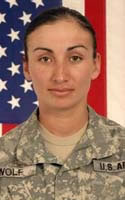
The third week in October is challenging for me. On 25 October, 2009, seven years ago, Army Sergeant Eduvigues Guadalupe Wolf was killed when her vehicle was struck by a rocket propelled grenade. SGT Wolf volunteered to fill an open spot on a convoy security escort patrol. She was an outstanding soldier, wife, mother, and warrior; her loss was felt immediately, and continues to be felt every year on this day, for me and for those who were with me.
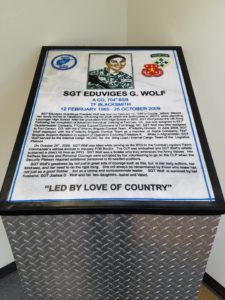
A memorial to Sgt Wolf was erected on FOB Fenty during our deployment there in 2010. A later deployment found the memorial returned by the unit to Fort Carson, Colorado, where it currently resides. I don’t know if the current members of the unit pay much attention to it on this day, but I think of it. Her name and this date is inscribed on a memorial outside of the main gate of Fort Carson.
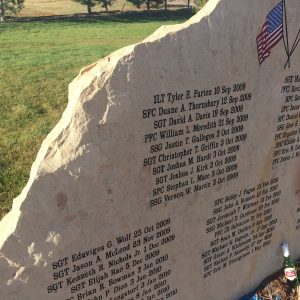
Her name and this date are inscribed in my memory. And my heart.
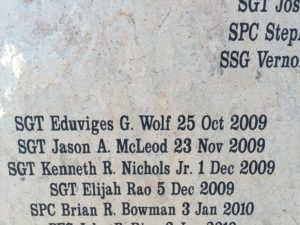
I share the story now. I didn’t for a very long time, and there is much more to the story of Sergeant Wolf than I have space for or inclination to provide. There are some very personal moments that I share with a relatively small group of my brothers and sisters that were there that day. Thank you for taking the time today to read, and thank you as always for your support for veterans everywhere.
One of my former Soldiers, who is a leader himself now, reminded the group of us who share this moment of this thought: this day will only be as hard as we make it.
Thank you for your sacrifice, Duvi.
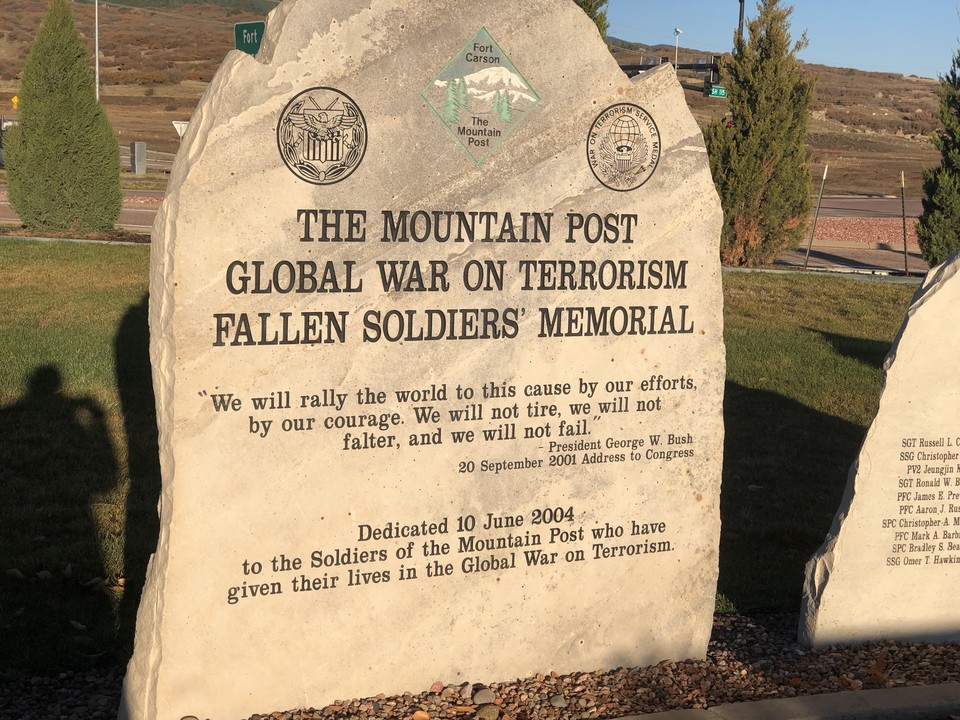
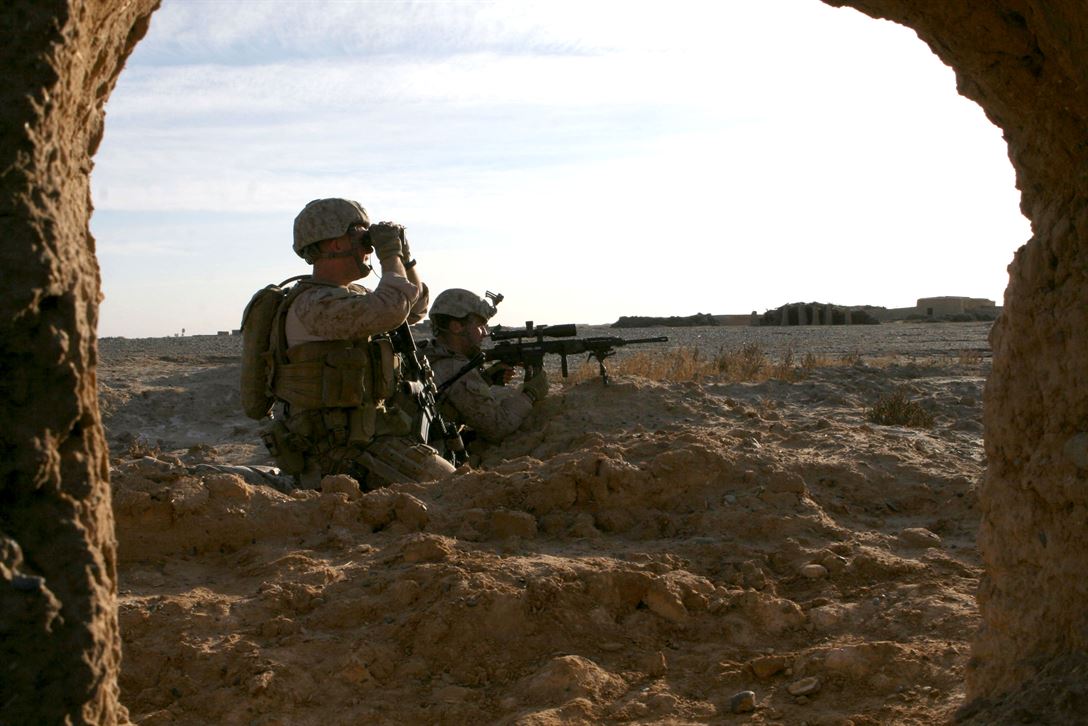
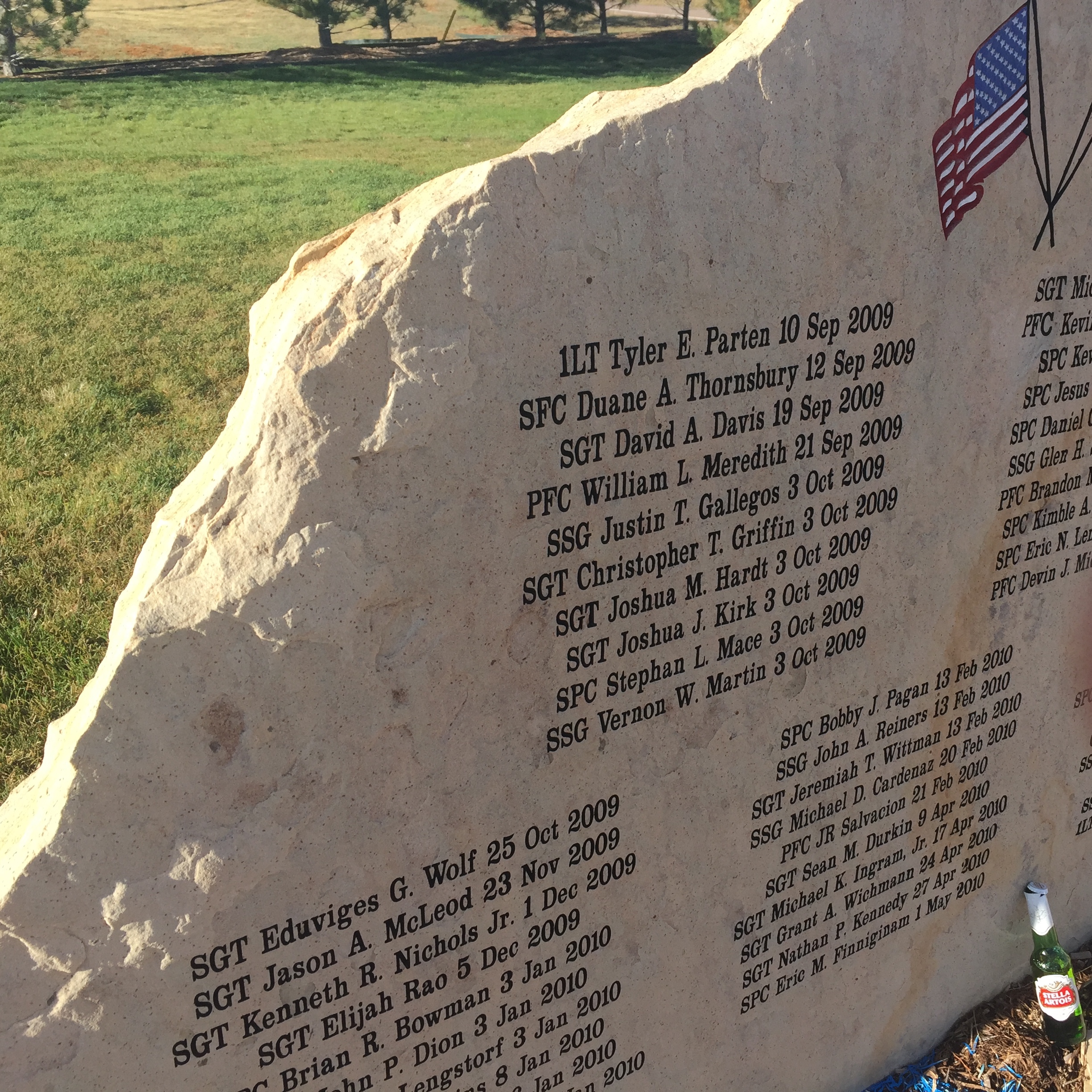
1 Comment
Change Your POV About Memorial Day – Head Space and Timing · May 4, 2017 at 5:44 am
[…] once a year. Those who have served, and those who have lost loved ones who’ve served, have Memorial Day throughout the year. And while we gather to remember together as a nation, we often forget the individual meaning of […]
Comments are closed.